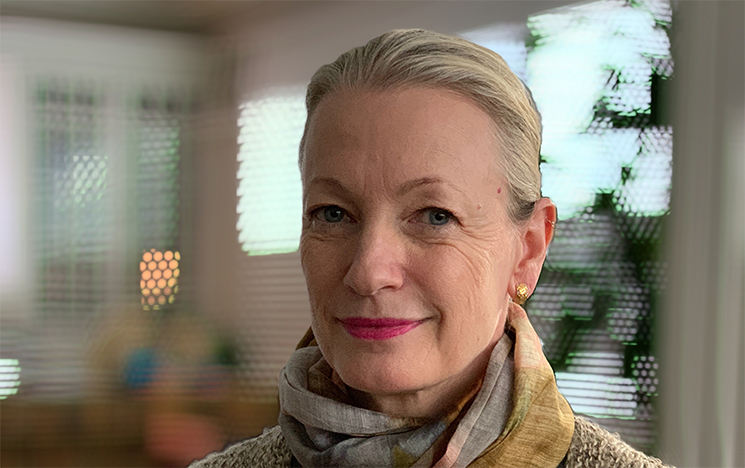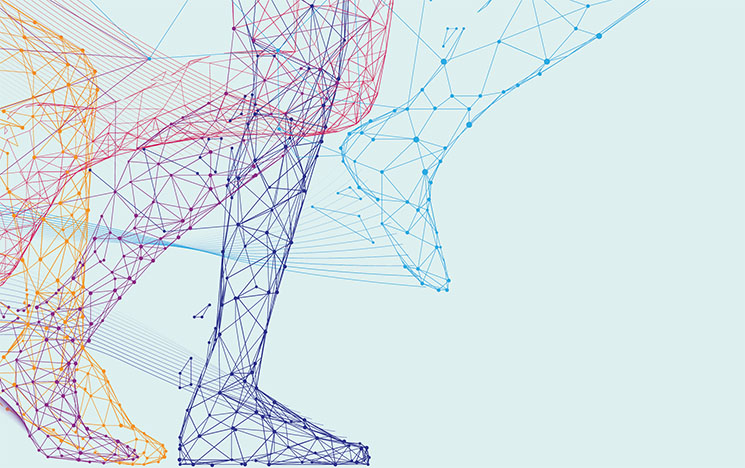Dancing with computers
Elizabeth Churchill (BIOLS 1980), Director of User Experience at Google, first became fascinated by the interaction between humans and computers when studying for an MSc in Knowledge Based Systems at Sussex. Here, she discusses the impact of artificial intelligence, the dangers of social media and the many benefits of tech developments for the future.

What came first – your interest in psychology or in technology?
Psychology. Most definitely. I got into AI (artificial intelligence) and cognitive science mainly because I wanted to understand human reasoning and learning. Cognitive models (simulating human problem-solving and mental processing in a computerised model) seemed like a reasonable approach.
I then became interested in augmentation; can we develop smart tools that elevate human reasoning rather than replace it? Tools that allow for a perfectly choreographed human-technology dance. Think of how two dancers can develop and then perform an elegantly executed piece. This fascination really developed when I worked on my MSc thesis at Sussex with Ben du Boulay on intelligent tutoring systems.
I was also deeply inspired by Professor Maggie Boden, who encouraged me to think of technologies and computational techniques as reflecting human values, and that we can look at what we build and see ourselves within it. What follows logically from that is that if we don’t reflect on our moral values, we can inadvertently create truly destructive experiences. We could start by just acknowledging we are not singular identities, but always shaped socially. That is what psychology teaches us.

What do you believe has been the greatest breakthrough in terms of human-computer interaction (HCI)?
What HCI has really done is to put the human at the centre of the design and development process. HCI is a broad area of interlocking disciplines, from human factors to applied computer science, to psychology. HCI initiated a series of innovations from design methods to user experience research and usability, to the idea of graphical user interfaces and voice user interfaces, to adaptive layouts and interfaces, and input devices that are designed for people.
Through the gathering and application of big data, are we on the threshold of a major change for good, or will we drown in it?
It is going in both directions. When I was doing my MSc at Sussex, one of my lecturers introduced me to the concept/phrase “Garbage in – Garbage out” – that is, if you don’t understand the data and the quality of the data you put into a ‘black box’ process, you will not truly understand the results you get out the other end.
So, the main problem I see is having too much confidence in the data without a deep reflective perspective on the provenance and quality of the data. Too often, people only see what they want to see and lack a robust approach to analysis. We need better tools for data quality evaluation and analysis, and for interrogating what is going on in the ‘black box(es)’.
Can we develop smart tools that elevate human reasoning rather than replace it? Tools that allow for a perfectly choreographed human-technology dance.”Elizabeth Churchill
BIOLS 1980
AI seems to be steaming ahead, with fears that it will heavily reduce jobs for humans. What is your view on this?
Technologies automate the easiest things to leave the hard tasks to people. There is a great paper, Ironies of Automation, which discusses the ways in which the automation of industrial processes may expand rather than eliminate problems with the human operator. I think the nature of work is changing and there will be jobs that go away and others that emerge. A good example is the role of the data scientist; there was no such career a few years ago.
Is technology causing us to lose our humanity and to be less kind?
Rather than less kind, I think we may be losing our experience of developing empathy for perspectives that do not align with our own. As many scholars have noted, we live in our own bubbles too much. We walk down the street and stare at our phones and don’t look at each other.
There is a really interesting book called Selfie which goes into the idea of social perfectionism and the unrealistic expectations it can burden people with. I worry that we are less kind to ourselves as a result of this; the feeling that we have to package ourselves is hurting a lot of teenagers in particular. Those who feel an extreme pressure to be a certain way, live a certain life, showcase a certain success, and hide feelings of vulnerability for fear of being ostracised or, even worse, bullied. People are so hard on themselves now and worried about their status updates. More self-compassion, more kindness to ourselves will, I believe, lead to more compassion and care for others. Affix your own mask before helping others, as they say.
What are you most optimistic about in terms of tech development in the future?
Medicine and new techniques for diagnosis. Also, smart prosthetics. And if AI is useful I’d like to see better educational tools that mould to different learning styles and different abilities to help people who are not ‘normal’ learners (for whatever normal means). For example, better support for those who are dyslexic, assistive tools for people with memory issues and assistive technologies for those with cognitive impairments. Also, assistive technologies to help older adults live independently, while ensuring they are not isolated.
I embrace the possibility that someone else’s perspective may be better than mine.”Elizabeth Churchill
BIOLS 1980
As an early recipient of industry investment in your MSc course, how important is it for universities and businesses to collaborate?
It is critical to empower leaders who understand the delicate balance between the short term demands of quarterly accounting budgets – and the resultant stresses on creativity – and the significant gains and long-term impacts of investing in longer-term research. Investing in students and in the institution who hosts them is an obvious win.
Do you ever doubt your own existence?
What an interesting and philosophical question! No, not really. I feel very solidly on this earth and of this earth. What I do try to question are my firmly held beliefs. I think it is critical that we don’t take ourselves too seriously. “Walk a mile in someone else’s shoes”, as they say. Someone else likely has different, if not more, information than I do. So, I doubt the existence of stable or perfect knowledge. And I embrace the possibility that someone else’s perspective may be better than mine.